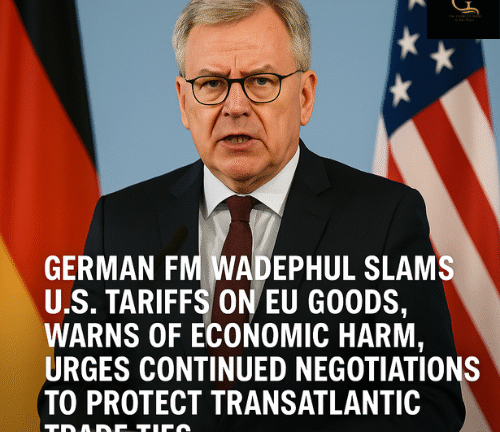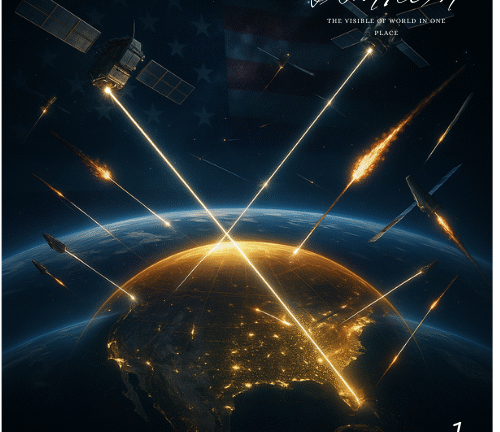In a development that highlights the intensifying frictions in transatlantic trade, German Foreign Minister Johann Wadephul has condemned U.S. President Donald Trump‘s plan for 50% tariffs on European Union products. Wadephul, speaking to the media from Berlin this week, characterized the tariffs as “economically disadvantageous to both parties” and cautioned against the long-term effects such protectionism could have on international markets and diplomatic ties.
The threatened tariffs, to be imposed widely on EU-produced goods such as cars, machinery, and household items, represent a sharp escalation of trade tensions. The move follows months of acrimonious negotiations between Brussels and Washington over allegations of unequal trade and industrial policy. Germany, the largest economy in Europe and a principal manufacturing center, could face dire consequences from the tariffs.
A Standoff Reignited
This is not the initial instance of trade tensions between Europe and the U.S. under Trump. Even his earlier administration from 2018–2020 witnessed a tariff storm and retaliatory measures, which cooled relations temporarily among major NATO allies. Even if diplomatic engagement was maintained by subsequent administrations, President Trump’s re-election in 2024 has indicated a reemphasis on “America First” economic nationalism.
Addressing a conference in Brussels on May 22, Wadephul said, “We consider these tariffs not only an economic mistake, but also a diplomatic failure. Punitive trade actions do not remedy structural issues—they create new ones.”
Germany’s export-dependent economy is especially at risk. More than 8% of all German exports are sent to the United States, and it is among Berlin’s most important trading partners, Germany’s Federal Statistical Office said. Car manufacturers Volkswagen, BMW, and Mercedes-Benz stand to be among the most affected if the tariffs are implemented.
A European Response in the Works
In reaction to the tariffs being proposed, the European Commission reaffirmed its willingness to continued negotiations but has also started to prepare for a list of retaliatory measures. These might include reciprocal tariffs on American goods from agricultural products to high-tech equipment. While EU officials still hope to avoid escalation, they’ve indicated that unilateral action from the United States will not be left unmet.
Wadephul underlined that Germany strongly supports the European Commission’s strategy. “Our power is through unity,” he said. “The European Union will protect its economic interests while continuing to promote fair and open markets.
EU Trade Commissioner Martina Delvecchio summoned an emergency summit with American counterparts to resolve the row, as well as discuss avenues toward a new transatlantic trade arrangement. Preliminary indications are that Washington is willing to consider sector-by-sector talks, but no agreement has yet been formally struck.
Economic Fallout
Aside from politics, the true effect of the tariffs will be experienced by consumers and businesses on both sides of the Atlantic. Economists forecast a decline in manufacturing and a potential hike in consumer prices, particularly across the automotive, aerospace, and electronics industries.
In Germany, the suggested tariffs have already started to shake investor confidence. The DAX index fell by close to 1.2% upon news of the U.S. proposal, with the shares of major exporters falling the most. German trade associations, such as the Federation of German Industries (BDI), have expressed alarm about long-term effects of trade uncertainty.
“We require stable conditions in which to invest and develop,” stated BDI President Siegfried Russwurm. “A tit-for-tat tariff war would be fatal not just for our companies but for the transatlantic relationship as a whole.”
Political Undercurrents
While Wadephul’s comments reflect Germany’s official stance, they also reveal deeper political undercurrents at play. With Germany’s new coalition government under Chancellor Friedrich Merz prioritizing economic growth and global competitiveness, any disruption to export markets poses a significant policy challenge.
In addition, Germany is attempting a fine balancing act: reassuring its commitment to the EU while keeping an open line with the U.S., a major ally on security and international diplomacy. “We would like to have good relations with Washington,” Wadephul said. “But strength is founded on respect, not power.”
Writers say the crisis may also be a flashpoint within the EU itself, as member states that have different economic ties to the U.S. weigh in on the best response. Ireland and the Netherlands, whose economies similarly rely heavily on transatlantic commerce, will most likely back Germany’s call for a common front.
The Bigger Picture
This episode serves as another reminder of the vulnerability of global trading systems in a growing polarized world. The World Trade Organization (WTO) has cautioned that protectionist tendencies have the potential to undermine the world’s recovery from recent economic shocks, including the prolonged effects of the COVID-19 pandemic and supply chain bottlenecks.
Germany’s call for diplomacy and multilateralism resonates with broader G7 and G20 concerns regarding the resurgent economic nationalism. As Wadephul correctly stated, “The world is too interconnected for us to retreat into isolation. We must build bridges, not barriers.”
Conclusion
As talks go on, much is at stake—not just for Germany and the EU but for the future of global cooperation. Whether or not the current standoff intensifies or subsides will be determined by the readiness of both parties to put regional prosperity ahead of short-term benefit.
In the meantime, Berlin’s message remains loud and clear: tariffs are politically convenient, but at a cost no one can pay.





